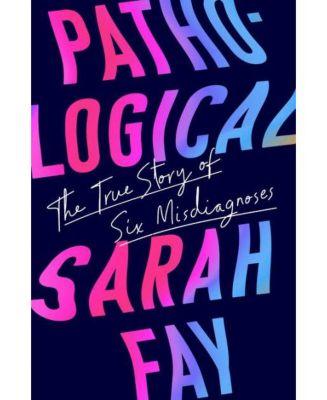Pathological- The True Story of Six Misdiagnoses by Sarah Fay
Product details
Web ID: 14147507Compelling Take Contemporary Mental Health Practic
Pathological is a memoir in part, a lesson in punctuation that is historical and metaphorical, and a book that asks us to seriously question the credibility and authority of the Diagnostic and Statistical Manual of Mental Disorders (DSM), presently in its fifth edition. I'm not sure who the audience with be for this, but I know just enough about the subject matter to say that Fay presents us with an extraordinary piece of research and a capable, interesting presentation that I expect it will interest to many people with less of a background than I personally have in her subject areas. I have been treated for major depressive disorder (my diagnosis) for fifty years and for ADHD (now called inattentive type) for thirty years. As a lawyer, I represented school districts when parents of special education students challenged their children's educational programing. Every one of these children had a DSM diagnosis and if a case went to a hearing, that diagnosis was central to the hearing officer's decision. I also majored in English and philosophy in college, making me a relatively knowledgeable reader. Writing well and using appropriate punctuation has been important to me for many, many years. It never occurred to me, and it is completely obvious now, that the DSM is merely a theoretical framework, created by committee and it has no -- zero-- scientific validity. It is a compendium, describing as many variations of human "abnormality," with descriptions and checklists that aide a diagnosis. It arose, not from science but from committees of people who treat mental health patients. Many things that we take as truth, such as the idea that depression is caused by a chemical imbalance in our brains or that if a medication helps with symptoms it confirms the diagnosis it was prescribed to treat are completely based on theories and anecdotal experience. A DSM diagnosis ensures reimbursement from insurance companies when a medical professional codes it into a patient's invoice. Fay reminds us that pharmaceutical companies and the various professionals who conduct studies financed by them stand to gain a lot from the business of psychiatric treatments. Is Fay saying that she and others cannot have experienced devastating, debilitating symptoms, suicidal ideation, disassociation? No. But she suggests hat there are other ways of framing these symptoms and perhaps of treating them, that it is problematic to misrepresent DSM diagnoses as being founded in established fact rather than theory. Fay challenges twenty-first century psychiatric norms, but she is not an all or nothing writer who would say that but for her six diagnoses of various mental health disorders, her life would have been fine. I like the attention she pays to the fact that many medications have serious side effects and/or are very difficult to discontinue. I continue to use antidepressants, but when changing medication I've gone through devastating experiences. In my family, there is a person who is so impacted by side effects of psychotropic drugs that a psychiatrist who has known her for years has taken her off everything. And the withdrawal from these medications was tough. She was overmedicated, by a different doctor, who did not listen to her and kept adding prescriptions that in fact were his attempt to even out her complaints about the side effects of the strong medications he put her on. She went in with postpartum depression and walked out a zombie on eight medications. His treatment left her incapable of caring for her child because of overmedication and her extreme sensitivity to prescription drugs. It took two years to detox her. His was a well regarded well known medical facility. Fay suggests that having a DSM diagnosis may cause those of us with mental health issues to live life as if we are our diagnoses. And that is something that rings true. I would not say, this solves particular issues that come with having the undeniably serious symptoms of mental illness, but it is a refreshing way to remind oneself to step back and recognize that these are symptoms, not who we fundamentally are. Because she has strong, well-researched positions, a compelling story to tell and she is not strident with her ideas, but sharing them and substantiating her points, her book deserves a lot of attention from mental health professionals and patients.
Recommends this product

Customer review from barnesandnoble.com

